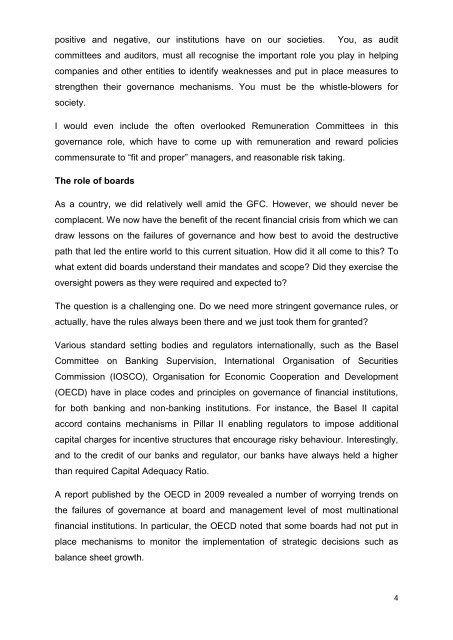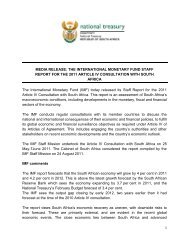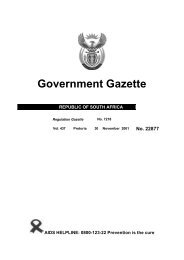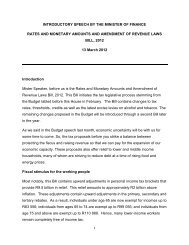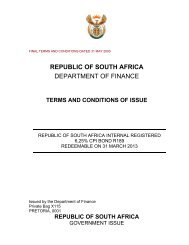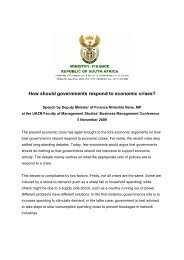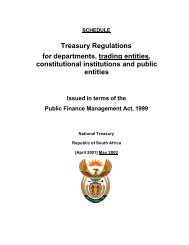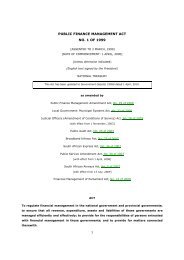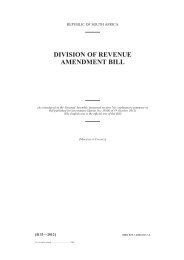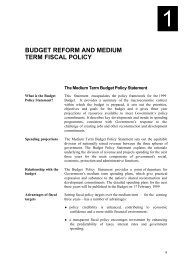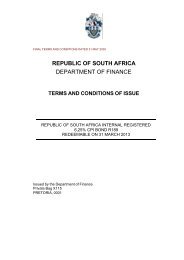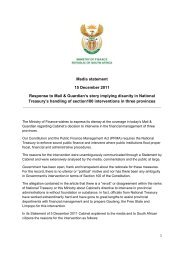Speech by Deputy Minister of Finance at the ... - National Treasury
Speech by Deputy Minister of Finance at the ... - National Treasury
Speech by Deputy Minister of Finance at the ... - National Treasury
You also want an ePaper? Increase the reach of your titles
YUMPU automatically turns print PDFs into web optimized ePapers that Google loves.
positive and neg<strong>at</strong>ive, our institutions have on our societies. You, as audit<br />
committees and auditors, must all recognise <strong>the</strong> important role you play in helping<br />
companies and o<strong>the</strong>r entities to identify weaknesses and put in place measures to<br />
streng<strong>the</strong>n <strong>the</strong>ir governance mechanisms. You must be <strong>the</strong> whistle-blowers for<br />
society.<br />
I would even include <strong>the</strong> <strong>of</strong>ten overlooked Remuner<strong>at</strong>ion Committees in this<br />
governance role, which have to come up with remuner<strong>at</strong>ion and reward policies<br />
commensur<strong>at</strong>e to “fit and proper” managers, and reasonable risk taking.<br />
The role <strong>of</strong> boards<br />
As a country, we did rel<strong>at</strong>ively well amid <strong>the</strong> GFC. However, we should never be<br />
complacent. We now have <strong>the</strong> benefit <strong>of</strong> <strong>the</strong> recent financial crisis from which we can<br />
draw lessons on <strong>the</strong> failures <strong>of</strong> governance and how best to avoid <strong>the</strong> destructive<br />
p<strong>at</strong>h th<strong>at</strong> led <strong>the</strong> entire world to this current situ<strong>at</strong>ion. How did it all come to this? To<br />
wh<strong>at</strong> extent did boards understand <strong>the</strong>ir mand<strong>at</strong>es and scope? Did <strong>the</strong>y exercise <strong>the</strong><br />
oversight powers as <strong>the</strong>y were required and expected to?<br />
The question is a challenging one. Do we need more stringent governance rules, or<br />
actually, have <strong>the</strong> rules always been <strong>the</strong>re and we just took <strong>the</strong>m for granted?<br />
Various standard setting bodies and regul<strong>at</strong>ors intern<strong>at</strong>ionally, such as <strong>the</strong> Basel<br />
Committee on Banking Supervision, Intern<strong>at</strong>ional Organis<strong>at</strong>ion <strong>of</strong> Securities<br />
Commission (IOSCO), Organis<strong>at</strong>ion for Economic Cooper<strong>at</strong>ion and Development<br />
(OECD) have in place codes and principles on governance <strong>of</strong> financial institutions,<br />
for both banking and non-banking institutions. For instance, <strong>the</strong> Basel II capital<br />
accord contains mechanisms in Pillar II enabling regul<strong>at</strong>ors to impose additional<br />
capital charges for incentive structures th<strong>at</strong> encourage risky behaviour. Interestingly,<br />
and to <strong>the</strong> credit <strong>of</strong> our banks and regul<strong>at</strong>or, our banks have always held a higher<br />
than required Capital Adequacy R<strong>at</strong>io.<br />
A report published <strong>by</strong> <strong>the</strong> OECD in 2009 revealed a number <strong>of</strong> worrying trends on<br />
<strong>the</strong> failures <strong>of</strong> governance <strong>at</strong> board and management level <strong>of</strong> most multin<strong>at</strong>ional<br />
financial institutions. In particular, <strong>the</strong> OECD noted th<strong>at</strong> some boards had not put in<br />
place mechanisms to monitor <strong>the</strong> implement<strong>at</strong>ion <strong>of</strong> str<strong>at</strong>egic decisions such as<br />
balance sheet growth.<br />
4


